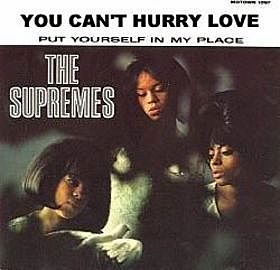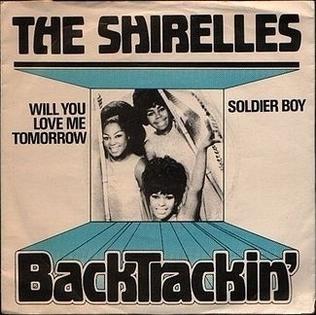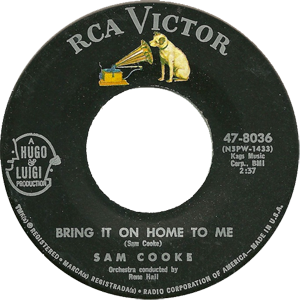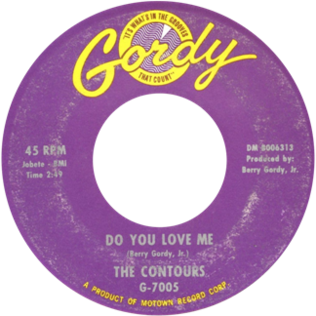
"Bridge over Troubled Water" is a song by the American folk rock duo Simon & Garfunkel, released in January 1970 as the second single from their fifth studio album, Bridge over Troubled Water (1970). It was written by Paul Simon and produced by Simon, Art Garfunkel and Roy Halee.

"You Can't Hurry Love" is a 1966 song originally recorded by the Supremes on the Motown label. It was released on July 25, 1966 as the second single from their studio album The Supremes A' Go-Go (1966).

The Dixie Hummingbirds are an influential American gospel music group, spanning more than 80 years from the jubilee quartet style of the 1920s, through the "hard gospel" quartet style of gospel's golden age in the 1940s and 1950s, to the eclectic pop-tinged songs of today. The Hummingbirds inspired a number of imitators, such as Jackie Wilson and James Brown, who adapted the shouting style and enthusiastic showmanship of hard gospel to secular themes to help create soul music in the 1960s.

There Goes Rhymin' Simon is the third solo studio album by American musician Paul Simon released in May 1973. It contains songs spanning several styles and genres, such as gospel and Dixieland. It received two nominations at the Grammy Awards of 1974, which were for Best Pop Vocal Performance, Male and Album of the Year.

"Drift Away" is a song by Mentor Williams, written in 1970 and originally recorded by British singer Mike Berry on his 1972 album Drift Away. A version by John Henry Kurtz was released two months later in November 1972. Mentor Williams was a country songwriter, and John Henry Kurtz was an actor and swamp rock singer. It was later given to soul singer Dobie Gray for whom it became a surprise international hit. In 1973, the song became Gray's biggest hit, peaking at number five on the US Billboard Hot 100 and receiving a gold certification from the Recording Industry Association of America (RIAA). The song has been covered by numerous musicians.

"Daniel" is a song written by English musician Elton John and his long-time songwriting partner Bernie Taupin, and performed by John. It was first released on John's 1973 album Don't Shoot Me I'm Only the Piano Player.

"Somebody to Love" is a song by the British rock band Queen, written by lead singer and pianist Freddie Mercury. It debuted on the band's 1976 album A Day at the Races and also appears on their 1981 compilation album Greatest Hits.

"Mother and Child Reunion" is a song by the American singer-songwriter Paul Simon. It was the lead single from his second studio album, Paul Simon (1972), released on Columbia Records. The song reached No. 4 on the Billboard Hot 100 chart in March 1972.

"Silly Love Songs" is a song by the British–American rock band Wings that was written by Paul and Linda McCartney. The song first appeared in March 1976 on the album Wings at the Speed of Sound, then it was released as a single backed with "Cook of the House" on 1 April in the US, and 30 April in the UK. The song, which features disco overtones, was seen as being written in response to music critics accusing McCartney of predominantly writing "silly love songs" and "sentimental slush"; however, McCartney has since clarified that the song was actually directed to John Lennon who accused him of writing such songs.

"Will You Love Me Tomorrow", sometimes known as "Will You Still Love Me Tomorrow", is a song written by Gerry Goffin and Carole King. It was first recorded in 1960 by the Shirelles; released as a single that November, it became the first song by an African-American girl group to top the Billboard Hot 100 chart. It has since been recorded by many other artists, including King on her 1971 album Tapestry.

"Bring It On Home to Me" is a song by American soul singer Sam Cooke, released on May 8, 1962, by RCA Victor. Produced by Hugo & Luigi, and arranged and conducted by René Hall, the song was the B-side to "Having a Party". The song peaked at number two on Billboard's Hot R&B Sides chart, and also charted at number 13 on the Billboard Hot 100. The song has become a pop standard, covered by numerous artists of different genres. It is one of The Rock and Roll Hall of Fame's 500 Songs that Shaped Rock and Roll.

"Do You Love Me" is a rhythm and blues song recorded by the Contours in 1962. Written and produced by Motown Records owner Berry Gordy Jr., it appeared twice on the Billboard Hot 100 chart, reaching numbers three in 1962 and eleven in 1988.

"Kodachrome" is a song by the American singer-songwriter Paul Simon. It was the lead single from his third studio album, There Goes Rhymin' Simon (1973), released on Columbia Records. The song is named after Kodak's now-discontinued reversal film brand, Kodachrome.

"Fly Like an Eagle" is a song written by American musician Steve Miller for the album of the same name. The song was released in the United Kingdom in August 1976 and in the United States in December 1976. It went to number two on the US Billboard Hot 100 for the week of March 12, 1977. The single edit can be found on Greatest Hits (1974–1978). It is often played in tandem with "Space Intro". On the album, the song segues into "Wild Mountain Honey".

"United We Stand" is a song written by Tony Hiller and Peter Simons. It was first released in 1970 by the Brotherhood of Man in their original, pre-Eurovision line-up, consisting of Goodison, Tony Burrows, Roger Greenaway, Sue Glover and Sunny Leslie. It became the band's first hit, peaking at #13 in the U.S., #9 in Canada, and #10 in the U.K. The song spent 15 weeks on the charts, and is ranked as the 64th biggest U.S. hit of 1970. It also reached #8 in Australia.

"Don't Pull Your Love" is the debut single by Hamilton, Joe Frank & Reynolds which became a top ten hit single in 1971. The song was written by Brian Potter and Dennis Lambert.

Paul Simon is an American singer-songwriter who is possibly best known as a member of the folk-duo Simon & Garfunkel with Art Garfunkel. He has released studio albums, live albums, compilation albums and singles. His music career has spanned over 60 years. He started recording music in the 1950s and his most recent album, Seven Psalms, was released on May 19, 2023.

"You Belong to Me" is a song written by American singer-songwriters Carly Simon and Michael McDonald. Originally recorded by McDonald's rock group The Doobie Brothers for their seventh studio album, Livin' on the Fault Line (1977), the song was made famous by Simon when she recorded it for her seventh studio album, Boys in the Trees (1978). A live version of the song from The Doobie Brothers' 1983 album Farewell Tour would later chart on the Pop Singles chart at No. 79 in August 1983.
"Please Love Me Forever" is a song written by John Malone and Ollie Blanchard. The song was originally released by Tommy Edwards in 1958. Hit versions were later released by Cathy Jean and the Roommates in 1960 and Bobby Vinton in 1967.

American singer Whitney Houston, known as "The Voice", released 57 singles as a leading artist and 4 as a featured artist. Houston is one of the best-selling music artists of all time, with over 220 million records sold worldwide. In the United States, Houston amassed 11 Billboard Hot 100 number-one singles, all of whom have been certified either gold, platinum, multi-platinum or diamond by the Recording Industry Association of America and was one of a selected group of artists to have a top ten single in the Billboard Hot 100 in four different decades. She is currently ranked in seventh place of the artists with the most number one singles in the history of the Billboard Hot 100. Prior to the introduction of digital singles, Houston sold 16.5 million physical singles in the country, the most ever by a female recording artist. In October 2012, the Official Charts Company claimed Houston was the fourth biggest-selling female singles artist of all time with a sales total of 8.5 million singles in that country.


















